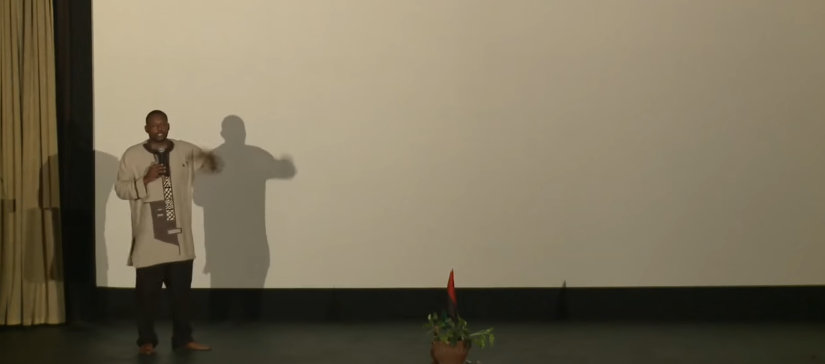Court: Ayo Kimathi Appeals Stop List Decision
[Written by Don Burgess]
An American man put on Bermuda’s stop list for comments said to “propagate hatred and messages of intolerance and discrimination” is appealing the decision.
Ayo Kimathi was put on the stop list in September 2015 by then Minister of Home Affairs Michael Fahy after Mr. Kimathi and Professor John Smalls spoke in Bermuda on September 26.
Screenshot from a video of Mr Kimathi speaking in Bermuda in 2015:
When Mr. Kimathi was banned, the Minister said the comments by Mr. Kimathi about homosexuality and interracial partnerships are “entirely offensive and propagate hatred,” and he has been added to the Bermuda stop list effective immediately.
At the time, Minister Fahy added: “I have received credible information from persons in attendance at the event on Saturday, September 26, 2015 and also reviewed in great detail the articles written by the Royal Gazette about Mr. Kimathi’s speech as well as those written by overseas publications on Mr. Kimathi himself. As a result of our enquiries I am of the view that his comments are highly offensive and that he is not the kind of person we want to visit Bermuda.”
Minister Fahy also said that Mr Kimathi “undertook the selling of promotional materials at the event which was outside of the scope of the permission relating to his visit to Bermuda.”
This week’s case, before Chief Justice Ian Kawaley, involved Mr. Kimathi and fellow applicant David Tucker, the man who brought Mr. Kimathi to Bermuda for the lecture, against the Attorney General and the Human rights Commission, et al.
Eugene Johnston, from J2 Chambers who represented Mr. Kimathi in court , said “there is a dispute as to what” Minister Fahy could have known when he made his decision. Mr. Johnston also questioned whether the Minister can place anyone on the stop list.
He also questioned the investigation power of the Human Rights Act and the definition of hate speech.
Mr. Johnston said the very investigative power of the HRC was an interference, as an investigation automatically triggers certain implications.
Mr. Johnston stated “nothing is disputed” about what Mr. Kimathi said. But what is important is the context and tone in which he said it.
“Numerous times during his presentation Kimathi asked the audience whether he should press ahead. The audience told him to do so. “
Mr. Johnston said it was worrying that people presenting cultural information can get kicked out of Bermuda.
“The lesson is the opinion of the presenter,” Mr. Johnston said. “The democratic tussle that takes place; that is where the freedom of expression actually exists.
“It doesn’t simply exist in outlining what factual matters may have existed without any opinionated or contextualization. It operates most in contextualization, that is where the debate is.”
Mr. Johnston said Mr. Kimathi was not advocating “destroying homosexuals and running them out of society” nor attacking white people for their beliefs.
“It was more addressing the question ‘what should black people culturally endorse.”
“There should be protection for certain speech that crosses a certain line… it’s just how far the dividing line needs to be drawn.”
The Chief Justice chipped in that it is not an easy question on the dividing line for freedom of expression ends and where hate speech begins.
He told Mr. Johnston he was framing the issue somewhat narrow in implying that is there is no action behind the hate speech, then it is okay.
“There ought to be a more restrained, philosophical and idealogical approach.”
He said in extreme cases, hate speech can lead to genocide and physical victimization of minority groups.
The Chief Justice said an approach has been adopted by the rest of the world in the Universal Declaration of Human Rights that in a democracy, the majority have to protect the rights of the minority.
One of the complaints Mr. Johnston had when searching for documented information on what the Minister had for making his decision is that the Chief Immigration Officer sent a short email to the Minister on October 1, 2015, three days after Minister Fahy made the decision. He said that was the extent of the documentation.
“You would expect that the memo would be replete with all the information the Minister needed to make that decision, it won’t take you long to look at the entire document – it is a paragraph long.”
Mr. Johnston added: “We have no issue with a person putting alternative views. We have no issue saying Mr. Kimathi is a bigot. Whatever they want to call him. We have no issues.
“What we take issue with this case is the formalized power or resource being used against Mr. Kimathi,” he added.
The Court hearing continues.


